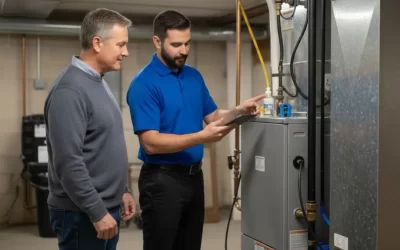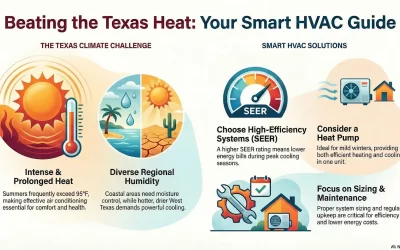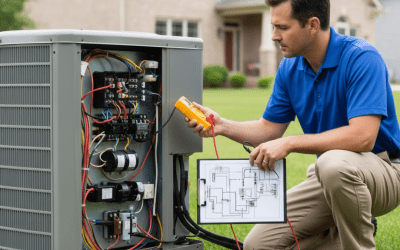Consistently working during every season of the year, your HVAC system may start losing its efficiency. This decline in performance does not just compromise indoor comfort but also greatly contributes to raised energy bills. Fortunately, you can easily control these elevated bills and save your money by keeping up the system with regular assessments and servicing.
While some may view annual maintenance as an added expense, the reality is that it’s just a smart investment. Let’s discover in detail how annual HVAC system maintenance saves you money for any homeowner looking to cut down on energy expenses and avoid costly breakdowns.
How Annual HVAC Tune-Ups Help You Cut Down Your Bills?
Check out below how annual HVAC maintenance saves you money in the long run.
System Inspection to Avoid Costly Repairs
A thorough inspection involves checking all major components, such as electrical connections, motors, belts, and thermostat calibration, to ensure the system runs efficiently and safely. During this inspection, hidden issues are uncovered, such as loose electrical connections or worn-out components, that can cause system inefficiencies or even sudden breakdowns. Identifying and addressing these problems early will help you prevent major failures that typically cost hundreds of dollars to repair. Moreover, regular inspections are likely to extend the equipment’s lifespan by 3 to 5 years which delays the significant expense of replacing an HVAC unit.
Energy Saving With Air Filter Replacement
One of the simplest yet most impactful tasks during an annual HVAC tune-up session is replacing or cleaning the air filter. Dirty filters restrict airflow, which causes the HVAC system to work harder and eventually leads to higher energy consumption while also increasing wear on components.
Replacing an air filter can improve your HVAC system’s energy efficiency by 5% to 15%, according to the U.S. Department of Energy. Beyond energy savings, clean filters also improve indoor air quality by trapping dust, allergens, and other pollutants. Health issues caused by poor indoor air quality can lead to additional medical expenses. This can be especially valuable in households with allergy sufferers or respiratory issues.
Coils and Components Cleaning
Evaporator and condenser coils are responsible for heat transfer in your HVAC system. Over time, when dirt and debris accumulate on these coils, their ability to transfer heat reduces, making the system consume more energy to maintain temperature.
Dirty coils can reduce system efficiency by up to 30%, significantly increasing energy consumption. Well-maintained coils with regular HVAC system maintenance ensure the system can cool or heat your home more effectively, reducing wear on parts like the compressor, which is one of the most expensive components to repair or replace.
One yearly check can avoid breakdowns and wasted energy. Keep your system in peak shape.
Refrigerant Level Check and Adjustment
Even a slight imbalance in refrigerant levels can cause the system to lose efficiency and lead to problems such as frozen coils or compressor failure.
Refrigerant leaks or low levels can reduce cooling efficiency, forcing the system to run longer and consume more energy to achieve the desired temperature. Proper refrigerant levels reduce strain on the compressor, helping to avoid premature failure, which can cost a significant amount to repair. Correctly maintaining these levels helps ensure that you are compromising on neither comfort nor your system’s efficiency.
Lubrication of Moving Parts
HVAC systems have many moving parts, including motors and bearings, that require regular lubrication to function smoothly. Friction between parts not only causes wear and tear but also forces the system to consume more energy. The chances of system breakdown also elevate as more force is applied to the parts, which leads to the need for emergency repairs.
Lubricating these components reduces friction, which can decrease the amount of energy required to operate the system. Over time, this contributes to both lower energy bills and extended system life. Including this small task like lubricating motors in your annual HVAC system tune-ups can prevent larger, more expensive repairs down the road.
System Performance Testing
After inspections and repairs, a technician tests your HVAC system to ensure it’s functioning optimally. This involves running the system in both heating and cooling modes to confirm that it’s operating efficiently under various conditions.
This testing ensures that your system is distributing air evenly throughout your home, avoiding hot and cold spots that often cause discomfort. It also helps verify that the thermostat is calibrated correctly, ensuring accurate temperature control. A poorly calibrated thermostat can lead to inefficient energy use, with heating or cooling running longer than necessary, driving up energy bills. By ensuring optimal performance, homeowners can maximize savings with HVAC tune-ups.
Tailored Recommendations and Upgrades
Based on the findings during a tune-up, technicians may offer personalized recommendations for improving your system’s performance. This could include upgrading to a programmable or smart thermostat, sealing ducts, or enhancing insulation in certain areas of your home.
Simple upgrades can lead to substantial energy savings. For example, installing a programmable thermostat can save on heating and cooling costs annually by optimizing temperature settings when you’re away or asleep. Sealing ductwork or improving insulation also ensures that your HVAC system doesn’t work harder than necessary.
Opportunity for System Upgrades
Every other day new technologies emerge as a better solution to the previous one, usually featuring better comfort, energy efficiency, and effective usage. Annual tune-ups ensure that your system stays up to date with the latest features and offers you extra perks. Not only does this offer effective usage, but it also is beneficial for retaining or enhancing long-term property value. The homes with upgraded systems and smart systems are likely to appeal more to customers who are willing to pay extra bucks for properties offering enhanced functionality.
Wrapping Up
Ensuring your system’s good health with these Seasonal HVAC maintenance tips can save you significant money while also providing extra comfort and healthy indoor air. Schedule an appointment for your annual HAVC with us and our professionals will ensure your system keeps saving you money with efficient performance. Check out HVAC maintenance plans by Classic Air Conditioning and Heating and take a step to make your system perform its best!






